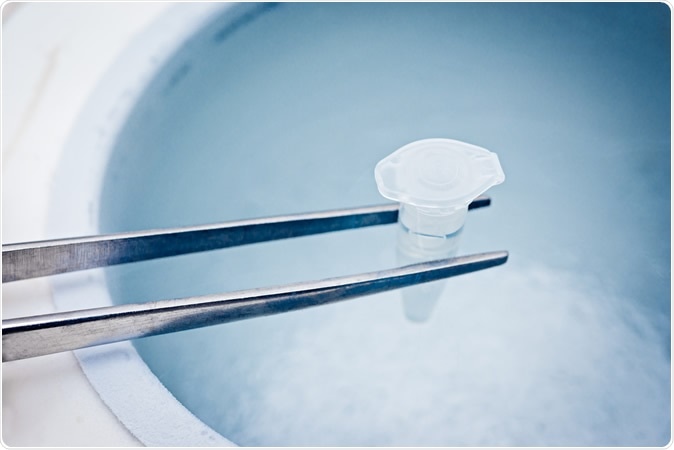A new article published in the Journal of Medical Ethics continues to defend the concept of sperm donation from dead men, in order to improve sperm quality, and quantity. This would go far in addressing the current deficiency of donor sperm. The chief points in the defence are that it is technically possible to extract sperm from a dead man’s body, it is ethically acceptable, and it eases human suffering by giving more people the ability to use donor sperm for reproductive purposes. Not only so, this allows a greater variety of preferences regarding the sperm donor to be fulfilled for the recipient individual or couples, which makes them happier.

Test tube with sperm, cryopreservation in the liquid nitrogen. Image Credit: Elena Pavlovich / Shutterstock
Post-mortem organ donation
Many organ donors have outlined their wishes and hopes that their bodies will one day benefit some other person after their death, by the use of their organs. However, the current article has to do with the ability to voluntarily donate their sperm for use by other unrelated or unknown individuals after their own death.
The need
The UK had about 590 new sperm donors in the period 2011 to 2013, up from the approximately 240 in 2004. However, many of these donors intended their sperm for one individual’s use to produce one child. The authors argue that since heterosexual (42% of those seeking artificial insemination with donor sperm) and lesbian couples (41%), as well as single women (17%), all request donor insemination as part of treatment to achieve conception, and there are also many more cycles involving in vitro fertilization with donor sperm, there is a huge need for donor sperm which is increasing. This is met today by importing sperm from Denmark and the US, about 3,000 and 4,000 samples a year, respectively, other than European countries. The Human Fertilisation and Embryology Authority (HFEA) argues that such imports are cheaper and better than trying to get living sperm donors within the UK itself.
The solution?
Given the fact that donor sperm is used primarily to relieve infertility, and that dead men provide a source of viable sperm which can give rise to healthy pregnancies, and that it is technically possible to retrieve high-quality sperm from dead men, the authors argue that posthumous sperm donation should be made a possibility just like other organ donations. They look forward to sperm extraction, storage in fertility banks, and its use by clients who need it. The benefits they envisage include greater sperm availability, though living donations may decrease as a result.
They also argue that allowing posthumous sperm donation allows men to donate sperm without the financial, legal and time constraints that hinder many living men from doing so. And thirdly, they point to the greater ability to match sperm donors to the intended parents of the offspring, whether in terms of race, educational attainment, or skin color. The reasons include psychological, the need to maintain privacy about the child’s origins, and to allow others to think of the child as the biological offspring of the parents.
The authors say that infertility, even if not considered a disease, is a condition that offers suffering and as such deserves that steps be taken to relieve it by all feasible methods. They compare sperm donation after death to corneal transplants, which are not strictly necessary but are considered “life-enhancing”.
Effects on the offspring are taken to be minimal considering the existing biological children conceived using living donor sperm. Similarly, effects on the family of the dead man are not considered valid in light of the fact that there are ways, such as arguing policy decisions, to soften the impact of the knowledge that the child conceived, if any, will have no special relationship to the dead donor’s family. Moreover, organ donation often does comfort the family of the dead donor with the thought that through death he has helped others live on, and the issue of sperm donation by the dead man may be considered in a similar light.
Of course, there are practical and policy-related problems that have not been addressed by the authors, but the underlying issue is one that ought to be thought through and dealt with, in the opinion of the authors. They sum up: “Many people hope that after death their bodies will be used to benefit others. It is both feasible and morally permissible for men to volunteer their sperm to be donated to strangers after death in order to ensure sufficient quantities of sperm with desired qualities.”
Others, like andrologist Allan Pacey, disagree, saying it sounds like a retrograde step in view of today’s movement towards reuniting donors of sperm with the offspring conceived through that sperm. He says, ““I’d much rather that we invested our energy in trying to recruit younger, healthy, willing donors who stand a good chance of being alive when the donor conceived person starts to become curious about them, and would have the opportunity to make contact with them without the aid of a spiritualist.”
And still others wonder if it’s a good idea at all to have a dead man father a child whom he will never see, by women whom he never thought of at all as partners, let alone mothers of his children – or should infertile couples just go the good old-fashioned way and adopt some of the millions of orphaned children out there seeking desperately for the comfort of parents and a home of their own?
Journal reference:
Hodson N, Parker JThe ethical case for non-directed postmortem sperm donationJournal of Medical Ethics Published Online First: 20 January 2020. doi: 10.1136/medethics-2019-105637, https://jme.bmj.com/content/early/2020/01/08/medethics-2019-105637